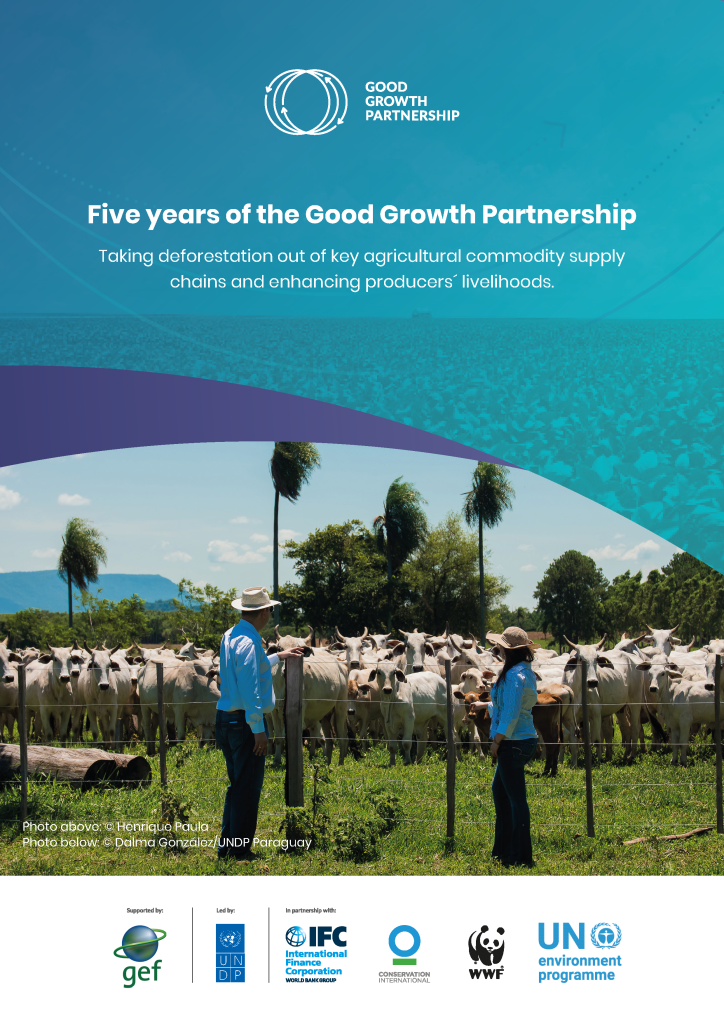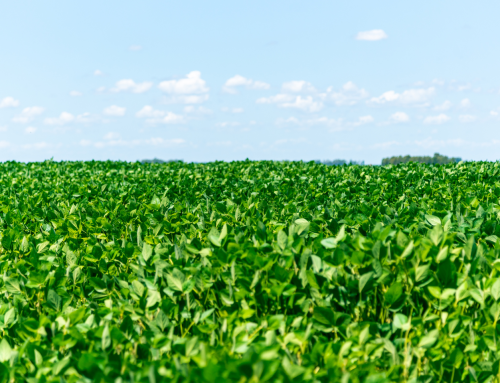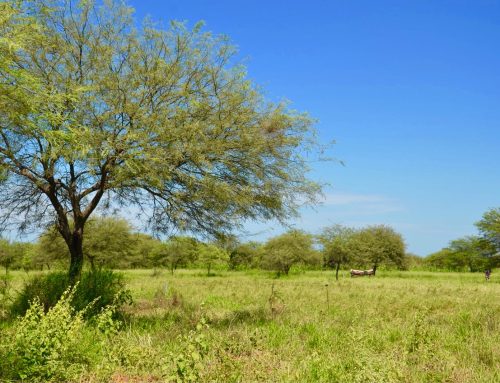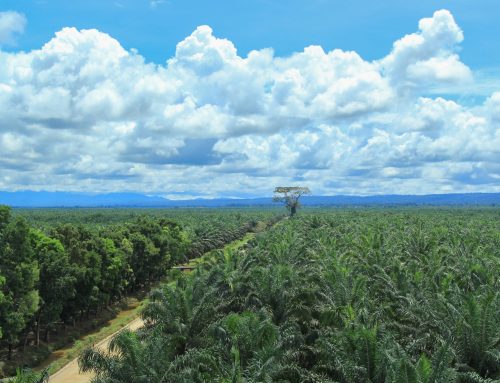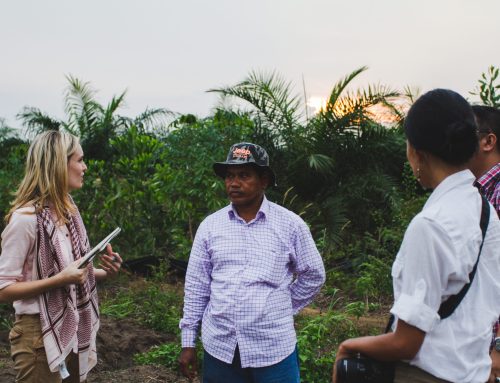The first five years of implementing the Global Environment Facility (GEF) Good Growth Partnership has driven home that working in strong collaboration with partners and connecting all parts of the supply chain – production, demand, and finance – is the best way to effect systemic change to take deforestation out of agricultural commodity supply chains.
Now we are proud to have brought together all the key facts about GGP and the way we work into a concise visual guide. In just 11 data-rich double pages we cover the impacts we have achieved in our four countries, and the ways we work to achieve them.
Driving change in silos has not produced the results we want. Because of the complexity of commodity systems, multiple system levers must be operated, in a variety of thematic areas and geographical scales, for true transformation to happen. Funded by the GEF for our first four years, the Partnership has made substantial progress towards sustainable commodity supply chains.
Over the five years, the Good Growth Partnership created momentum in Brazil, Indonesia, Liberia and Paraguay to accelerate sustainable production. The Partnership established or strengthened 22 national and sub-national multi- stakeholder and commodity-focused platforms bringing together stakeholders in target commodities and landscapes. Through these forums, trust between stakeholders was enhanced and visions and clear pathways to sustainability for critical supply chains were defined. Nine action plans for sustainable commodity production were collaboratively developed at the national and subnational levels, of which six are already being implemented. These action plans contain interventions needed to reform the industry, laying the foundation for unlocking public and private financing and investment to undertake them. The platforms and plans also created mechanisms for coordination and alignment across stakeholders and sectors, and at various scales, helping to consider trade-offs and break down silos, all prerequisites for achieving systemic change.
As a contribution to action plan implementation, the Partnership supported the development or improvement of 28 policies enabling sustainable production or improving land use allocation. Seven of these policies have been legalized and/ or are being implemented today. Examples of these include strengthened farmer extension systems, and preserving important conservation areas or forests from conversion to agriculture or livestock production as a result of better land use planning. Over the past five years, the Partnership supported the generation of Global Environmental Benefits, such as introducing or strengthening natural resource management practices leading to improved management of over seven million hectares of lands and the avoidance of almost 30 million tonnes of CO2 emissions.
As a means of addressing deforestation in production, the Partnership has taken a systems approach, working across sectors and geographic scales to activate the right incentives, such as finance and market drivers, to encourage sustainable production. The Partnership helped drive US$ 16+ million in new investments toward sustainable production of Paraguayan beef and Indonesian palm oil, and increased the capacity of more than 135 financial institutions to address environmental, social, and governance risks in their portfolios. This created financial incentives for producers to shift their practices.
On the market side, the programme collaborated closely with global traders, manufacturers of consumer goods and retailers to help them source more sustainably. Today, more than 85 companies that the Partnership engaged with one- on-one and through platforms have made new or strengthened commitments to sustainable supply chains. Many of these were directly supported in implementing their commitments through technical assistance, training and tools developed by the Partnership. Supply chain transparency was substantially improved for palm oil, beef and soy globally thanks to the Partnership’s support of the TRASE land use monitoring platform. With more demand for responsible commodities and increased transparency in the supply chain, producers are incentivized to shift toward sustainable practices to capture a growing market and avoid the increasing risks of being linked to deforestation.
Recognizing that the challenges we face are significant, complex, and ever changing, the Partnership continuously strived to generate, capture and share knowledge. From improving gender equality and women’s empowerment in commodity supply chains to toolkits for sustainable sourcing, over 73 resources and tools have been developed and shared by the Partnership. Our main publications are available from the Tools and Resources library on the Good Growth Partnership website.
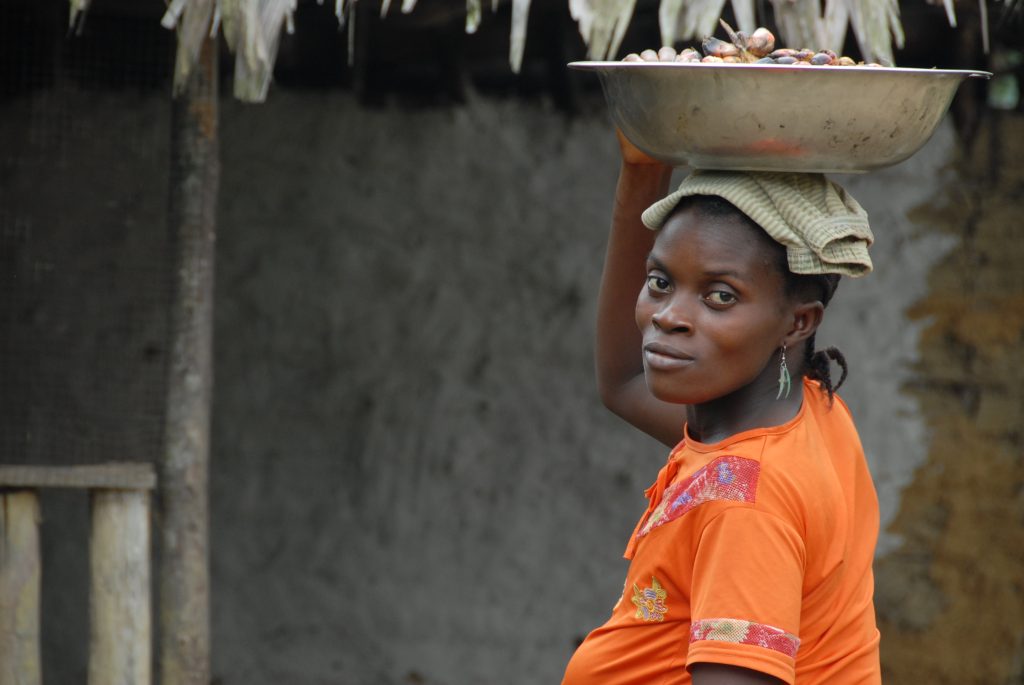
© Conservation International / Photo by Mike Matarasso
Hurdles, learning and opportunities
While the above achievements are truly worth celebrating, challenges remain. More work and time is needed to tackle the complexity and resistance to change in the system resulting from power dynamics, lobbying, profit-driven agendas, growth- focused economies, etc., to achieve long lasting systemic transformation. This takes time and skillful facilitation that should be nurtured from global to local levels. Reformed policies can only be effective in triggering change if implemented and enforced. However, resources and capacities are not always guaranteed long term, and more support is needed to put national and subnational governments on the path to address these issues. In addition, even though levers for sustainable commodity production are pulled, from legal frameworks to finance and demand incentives, capacities are strengthened, and knowledge shared for replication, resistance to change from the system is still strong.
While the COVID-19 pandemic threw up significant hurdles, recovery from this crisis may also be embraced as an opportunity to lay the foundations for more sustainable and resilient food and commodity systems. The Good Growth Partnership can play a pivotal role in green recovery efforts by supporting stakeholders and activating the right incentives for sustainable production.
Each Good Growth programme partner has a large portfolio of work supporting the achievement of sustainable landscapes through forest-positive commodity supply chains. Despite challenges that a complex partnership as well as integration across interventions and projects can present, Good Growth programme partners successfully overcame them thanks to trusting relationships that have been built over years. In the past four years, we demonstrated that a partnership of complementary organizations, well represented on the ground and globally, and able to combine their networks and expertise, will not only engage producers and companies, governments and financial institutions toward complementary aims but when done so together and at all geographic scales can pull enough levers of change at the same time to tilt the system towards a paradigm shift.
These lessons and the journey have renewed our commitment to work together in contributing towards systems level transformation for the remainder of the Good Growth Partnership programme and to continue joining forces under a second phase of the Partnership following on from the GEF programme. We are keen to build on the programme’s assets, results, experiences and learning.
“Shifting commodity systems toward true sustainability takes time, but our progress so far confirms that we are on the right track. The programme now needs to concentrate on further aligning and integrating incentives for farmers to shift their practices at scale and hence improve the systems in which they operate. We believe the Partnership’s experience can help connect and link formerly siloed incentive schemes across and within geographical scales and sectors to generate greater influence.” says Pascale Bonzom, GGP Global Project Manager.
Pascale Bonzom, Global Project Manager Good Growth Partnership, UNDP
Lara Yacob, GGP Sustainable Transactions Project Manager, UNEP FI
Dieter Fischer, Senior Operations Officer, MAS Agribusiness Advisory Services, IFC
Margaret Arbuthnot, Director, Commodity Markets, GGP Responsible Demand Project Manager, WWF US
Amanda Sennert, Director, Multilateral Relations, Conservation International
Click on the image below to download the Five Years of the Good Growth Partnership Visual Guide.

